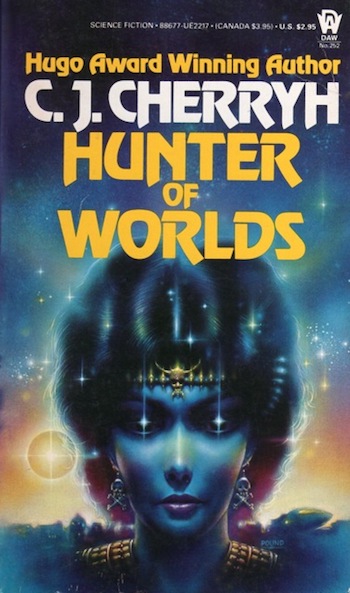I’m going to take a bit of a side road and talk about linguistic worldbuilding for a few columns, maybe more, depending on which books I can read next. What do I mean by linguistic worldbuilding? Anything from the phonetics and phonology of alien species and the phonotactics derived from that to the invention of languages (which doesn’t have to be as detailed as it is in Tolkien’s work, and could be simply the use of a handful of invented words to represent a particular concept in a particular alien species). Using invented language to highlight differences among alien species can be a very effective tool in a writer’s toolbox, and you don’t have to go Full Tolkien in order to do it. Figuring out the most important features of your alien society (or societies), and/or their psychology, and thinking about how that would affect their language can profoundly deepen the overall worldbuilding.
The first entry in this subseries is CJ Cherryh’s 1977 novel Hunter of Worlds, which comes with a glossary at the end (or in the beginning, if you have an ebook; I have the omnibus volume from 2003 which also includes Brothers of Earth). This book tells the story of Aiela, a kallia who is abducted by the iduve Chimele and all memory of him is then wiped from the system. Kallia are a humanoid alien species which live in fear of the iduve, who overran many planets in the distant past, then largely disappeared. The iduve are humanoid space-farers, but they are predators and have the instincts of predatory species, like the big cats; they do not psychologically understand kalliran society or internality. The amaut are a third variety of alien species which is not humanoid. Humans are a minor, threatened presence at the edge of kallian space, and they are described as having no language or way to communicate at all.
After Aiela is abducted, he undergoes a procedure of implanting a mind link with one of Chimele’s noi kame, a bondchild, without his consent. Isande is not particularly pleased to have him in her head, but she grudgingly accedes to Chimele’s wish, and she shares her knowledge of iduve society with him. Soon after he is acclimated to the link with Isande, Chimele tells Aiela that he is also going to be mind linked to a human they took captive, to see if he can learn the human’s language and gain information about various goings-on in human space that could be linked to Chimele’s outcast brother. Throughout the book, Aiela chafes against what a thousand years of captivity has done to the kallia on Chimele’s ship and the ways in which their society differs from free kalliran society, even as their words and language are the same. He acts the way he would among his own people, and this provokes the iduve’s predatory responses as if he were prey. Daniel, the human, also has trouble fitting into iduve society, and it is up to Aiela to interpret him to the iduve, even as Isande interprets the iduve to him.
As I was reading this (technically re-reading, but the first read was 15 years ago, so it was like new), my mind drew connections to the Foreigner series, with Aiela as a proto-Bren Cameron and the iduve as proto-atevi.
In the realm of worldbuilding, Cherryh’s fragmentary invented languages contain, for the most part, words that would have different connotations in English or would require multiple words to explain every time, so it makes sense to invent words. For example, the Kalliran word elethia means ‘honor, gentility, proper behavior; faithfulness to duty.’ Honor in English covers a lot of that, but not all, and Cherryh doesn’t want us to associate it with human (Anglophone) concepts of honor. Whereas the word giyre, meaning ‘recognition of one’s proper place in the cosmic Order of things; also one’s proper duty toward another. Ideally it is mutual,’ has no real equivalent in English, whether a single word or a short phrase. So, like the gleeful adoption of Danish hygge into English, using giyre in this fictional setting to represent a psychological aspect of a fictional species makes sense. Even so, an Anglophone reader of the book can by and large comprehend the concepts of elethia and giyre, whether or not they are part of our psychological make-up.
Buy the Book


Network Effect
The iduve language, however, is used to highlight the differences between iduve and human (and kalliran) societies to great effect. The introductory paragraph to the iduve glossary states that it “differs from both kalliran and human speech to such a degree that translation cannot be made literally if it is to be understandable. Paraphrase is the best that can be done.” Cherryh describes the differing conceptions of parts of speech, how iduve doesn’t distinguish between noun and verb, but uses the Ethical and the Tangible, which can be converted from one into the other. It uses particles to mark things such as negation, honorifics, hypotheticals, historical, or descriptive. Iduve phonology uses the guttural -kh- frequently, and seems to like /k/ in general, at least in the selection of vocabulary we’re given.
Iduve have different words for mating to produce offspring (katasakke) and mating for pleasure (katasukke), which is only done with non-iduve. They also have a specific mating for the production of heirs (kataberihe), which requires ritual abstinence beforehand. The word chanokia refers to artistry, but also ‘the practice of virtue, the studied avoidance of crudity, and a searching after elegance and originality.’
Perhaps the most important word, from the predator-prey standpoint, is harachia, which is defined thus: ‘lit.: presence, seeing. Visual impact of a person, thing, or situation which elicits an irrational response.’ On many occasions, Aiela evokes harachia (usually inadvertently) in the iduve, and the first time he does, he is unaware of the danger he is in, because the iduve’s predatory instincts are awakened and they could kill him without a second thought.
The iduve sense of honor, arastiethe, includes the ‘power and burden of being iduve, of being of a particular nasul [clan], or simply of being oneself. Honor is the obligation to use power, even against personal preference, to maintain moral and physical integrity. M’metanei [iduve-like species] naturally possess no arastiethe, but to describe admirable traits in m’metanei, the iduve have adopted the kalliran word elethia.’ If Cherryh had used the word honor to represent both elethia and arastiethe, it would have been misleading. Even though elethia maps somewhat onto English honor, arastiethe does not.
Cherryh’s worldbuilding is enhanced by the use of invented words, and they add to the sense of Alien-ness of the aliens she creates. This is a running theme in her work, where aliens aren’t just humans with blue skin or funny foreheads, but often psychologically very distinct from humans in a variety of ways.
CD Covington has masters degrees in German and Linguistics, likes science fiction and roller derby, and misses having a cat. She is a graduate of Viable Paradise 17 and has published short stories in anthologies, most recently the story “Debridement” in Survivor, edited by Mary Anne Mohanraj and J.J. Pionke.










